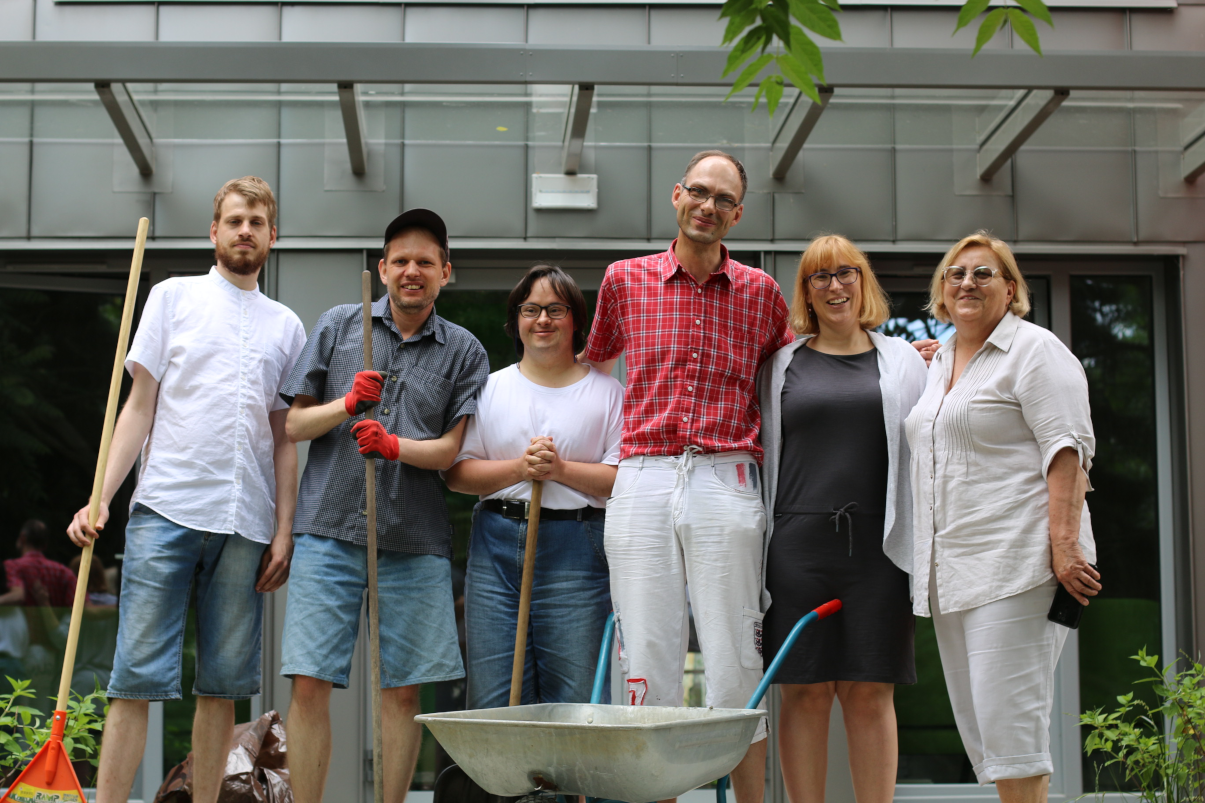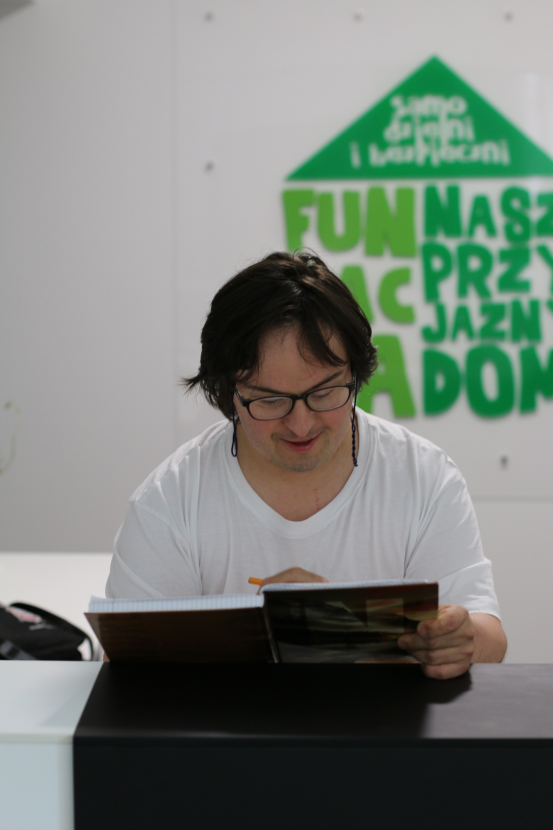Our Friendly Home in Sopot – only such place in Poland
When a family member with a disability appears, there is a beginning of big struggle of parents’ own feelings, fight with the difficulties and the system... Over time there is uncertainty and fear for the child's future. What will happen when I am gone? Who will take care of my child's feelings and safety? These and other questions are asked by parents with disabilities throughout their lives. Sooner or later, there comes a point when providing an independent and safe place for an adult child with a disability becomes a priority for the older parent, especially for single parent.
In the centre of Sopot, a few minutes’ walk from the beach and the pier, in The Herbst Park, a unique place was build: Our Friendly Home (Nasz Przyjazny Dom). The house started to bustle with life before Christmas 2020, when Peter and Michael - the first of 12 residents - moved in. Gradually, others joined in.
The two-storey house was built thanks to the enormous determination and contribution of private funds of the parents of disabled children. They created Our Friendly Home Foundation in 2013 to make it possible. They have got a great support of the Sopot authorities who donated land for the building, as well as the commitment of companies who supported the initiative, despite the global crisis caused by the Sars-CoV2 coronavirus pandemic.

The residents take care of the house and its surroundings themselves. From the left: Wojtek L., Sebastian W., Wojtek B., Piotr J. and caretaker Barbara Krzyślak and president of the Foundation Our Friendly Home Renata Birtus (Photo by Sylwia Kurszewska)
The creation of this place is an excellent example of social innovation. It is currently the only such house in Poland. Assistants and a carers support residents in resourcefulness of life, rehabilitation, participation in social life and professional activation within the framework of economic activity run by the Foundation. The parents pay for the residents' stay at the house each month. However, this is a drop in the ocean of needs. That is why, you can get following paid services in Our Friendly Home in Sopot:
-
the house offers 3 double guest rooms
-
conference area for workshops, trainings or other business meetings for up to 70 people
-
rehabilitation services mainly for elderly residents (for example there is hyperbaric chamber in the house)
-
respite services – short-term relief for parents of people with disabilities struggling to find time for themselves. The person with a disability will join the residents of the home whilst his/her family will be able to take advantage of the free time at least for a short period of time.
The journey to independence began for all residents under the guidance of assistants and carers after moving the Our Friendly Home. What is their daily life looks like? They eat meals together, take care of their rooms and common areas, help each other, go to workshops, therapeutic classes and take part in various activities in the Tricity, e.g. they play in theatre or music band. Six of them work, five at the reception desk in the house, one at the Nursing Home in Sopot.

Wojtek B. during his work at the reception desk (Photo by Sylwia Kurszewska)
When asked residents how they feel about living in Our Friendly Home, they all say that it is their new home now. However, the beginning was not sometimes easy for everyone. There were difficult moments, mainly because of the huge change and the longing for their parents. Fortunately, there are mobile phones, so they make sure to keep in touch with their parents often, visiting each other. This contact is especially important for parents, especially single mothers, who have suffered from empty nest syndrome and have not been able to find their way in the new reality. Since they moved, life has changed completely. House residents say:
Now we have to be more independent, we have a lot of responsibilities, we are sometimes tired after work, but here we have our own home and we like to come back here. We also have friends and like to spend time together. It is fun. Our assistants help us with all our problems and are very nice.
What's more, several of them have found love after moving here. Others are looking for it.
In the house you feel a very friendly atmosphere. Right from the threshold, visitors are greeted with a smile by the residents working at the reception desk. They happily talk about how they would like to run their own café in future. While mowing and raking the grass around the house, they plan tomorrow. Our Friendly Home is a place that integrates. You can hear about the many positive activities behind which stand the parents and carers who give their hearts to this place. However, managing such a place involves many logistical, administrative, financial or pandemic challenges that make many activities not easy. All the more reason to showcase and support such wonderful, unique initiatives!
The involvement of every single person participating in the creation and functioning of this place is important since the beginning. However, it is impossible not to emphasise the merits of Mrs Renata Birtus - mother of one of the wards, president of Our Friendly Home Foundation. Everything began in her mind. The need to create such a home arose many years ago, when she feared about the future and safety of her disabled son, when neither she nor her husband would be around. Mrs Renata Birtus and her husband Jacek donated the assets to build the house. They also encouraged other parents to join this project by making a financial contribution. The Birtus family did not think only about their son, but also about other disabled people and their parents. As Renata recalls, to build and organize Our Friendly Home, many doors had to be knocked on. There were a lot of stumbling blocks. There were many doubts and disappointments along the way. For example, the fact that the allocation of a plot of land by the city for this type of investment aroused dissatisfaction and protests among some residents. Eventually, the house was built. The impossible became possible!
Sylwia Kurszewska – professionally connected with the Centre of Continuing in Sopot, where she coordinates the activities of the international projects team, undertaking initiatives for various social groups. Educator. President of the Work-Education-Health Association, acting for the socially excluded or at risk of such exclusion. EPALE Ambassador.
Nóta tráchta
Czy nie ma w nas wystarczającego zrozumienia potrzeb opiekunów?
Masz rację, z obserwacji w swoim najbliższym otoczeniu wiem, że często "współczujemy" opiekunom osób niepełnosprawnych, schorowanych członków rodzin i innych osób zależnych. Rzadko, jako rodzina czy przyjaciele, oferujemy im wsparcie w postaci umożliwienia spędzenia czasu, tak jak znajomy nam opiekun czy opiekunka mogliby tego potrzebować (np. wyjazd na weekend, wyjście do znajomych na urodziny itp. by nie musieli co chwile spoglądać na zegarek i sprawdzać czy już muszą wracać do domu np. do chorej mamy). Ostatnio np. rozmawiałam z mamą niepełnosprawnego dziecka, która była rozżalona brakiem zrozumienia ze strony własnego męża, gdy po powrocie ze wspólnego urlopu z rodziną powiedziała, że w ogóle nie wypoczęła.
Nie dziwi więc fakt, że pomysł wsparcia w postaci oferowania momentu wytchnienia w NPD narodził się w głowie matki dziecka z niepełnosprawnością. Na szczęście powoli się to zmienia i dobrze, że różne instytucje zaczynają oferować usługi w zakresie opieki wytchnieniowej.
Po raz kolejny niemożliwe stało się możliwe..
Po raz kolejny niemożliwe stało się możliwe... ten tekst daje nadzieję. Nie tylko w kontekście tworzenia tego typu miejsc ale również w każdym innym wyzwaniu, którego się podejmujemy. Wspaniale, że są ludzie, którzy widzą potrzebę, mają wizję i szukają rozwiązań, by realizować swój plan. Zapisuję adres - chętnie skorzystam z tego miejsca będą w Sopocie, a przy okazji polecam Pensjonat u Pana Cogito, który znajduje się w Krakowie i również jest miejscem wyjątkowym.
Kolejny przykład fantastycznej inicjatywy!
Karolino, dziękuję za kolejny przykład fantastycznej inicjatywy! Jako edukatorzy powinniśmy mówić jak najwięcej o tzw. "społecznej odpowiedzialności biznesu" i wymieniać się takimi kontaktami. Ja również zapisuję adres.
Wiem, jak ważne w przypadku takich miejsc jak "Nasz Przyjazny Dom w Sopocie" czy "Pensjonat U Pana Cogito w Krakowie" jest kontakt osób pracujących tam z klientami. Praca w takim miejscu pozwala pracownikom m.in. czuć się potrzebnym, a korzystającym z usług daje poczucie zrobienia czegoś niewielkiego z jednej strony, a jakże ważnego z drugiej :)
Dziękuje za podzielenie się…
Dziękuje za podzielenie się tą wspaniałą innowacją! Z pewnością warta jest szerzenia! Bardzo zainteresowały mnie formy dodatkowej możliwości wsparcia NPD, które są tak różnorodne. Mam nadzieję, że NPD szybko stanie się miejscem wielu odwiedzin, zarówno przyjezdnych, jak i rodzin, które potrzebują chwili wytchnienia.
Inspiracja do działania i zaangażowania
Nino, mam nadzieję, że takich miejsc będzie powstawało coraz więcej! Tworzenie ich jest niezwykle trudne, ale jak się okazuje, nie niemożliwe. Warto mówić o takich przykładach bo inspirują do działania, zaangażowania i nie poddawania się :)
Wspaniała inicjatywa
Wspaniała inicjatywa, dobre miejsce na wypoczynek i najważniejsze- zatrzymując się w Przyjaznym Domu możemy pomóc. Cieszę się, że przy powstawaniu tego miejsca tak wielu ludzi zjednoczyło swoje siły. Droga do samodzielności jest zawsze w budowie.
Droga do samodzielności...
Tak jak piszesz Marto, droga do samodzielności jest zawsze w budowie. W przypadku osób z niepełnosprawnościami droga ta do łatwych nie należy, a bez odpowiedniego wsparcia nie prowadzi za daleko. Jak zauważasz, wiele osób połączyło siły by ten dom powstał. Potrzebna była tu ogromna wiara w potencjał i umiejętności osób z niepełnosprawnościami. Wielu z nas tej wiary niestety brakuje. Jako trener/coach zapewne możesz powiedzieć więcej na temat kierowania procesem zmian, by mieszkańcy Naszego Przyjaznego Domu w Sopocie mogli osiągać samodzielność. Na chwilę obecną mieszkańcy domu mają za sobą odwiedziny pierwszych turystów i obsługę pierwszych konferencji. Wierzę, że to miejsce będzie szybko się rozwijać i dobrze funkcjonować, a odwiedzający turyści/klienci będą czuć się w tym miejscu dobrze i chętnie do niego wrócą.





wytchnienie
Fajne jest oddawanie głosu samym podopiecznym, co w tym wpisie robisz. W końcu to o nich chodzi, oni/one są tu najważniejsi. Zwróciłem też uwagę na jeden bardzo ważny aspekt funkcjonowania takich miejsc - funkcja dawania czasu...wytchnienia opiekunom nieformalnym (czyli najczęściej bliskim, rodzinie). Mam wrażenie, ze często się o tym zapomina, a dyskusja o osobach (części z nich) żyjących z niepełnosprawnościami, to także rozmowa o całym otoczeniu, osobach, które je wspierają, i którym należy się za to jeśli nie tradycyjne wynagrodzenie, to na pewno wsparcie w postaci oferowania momentu wytchnienia..